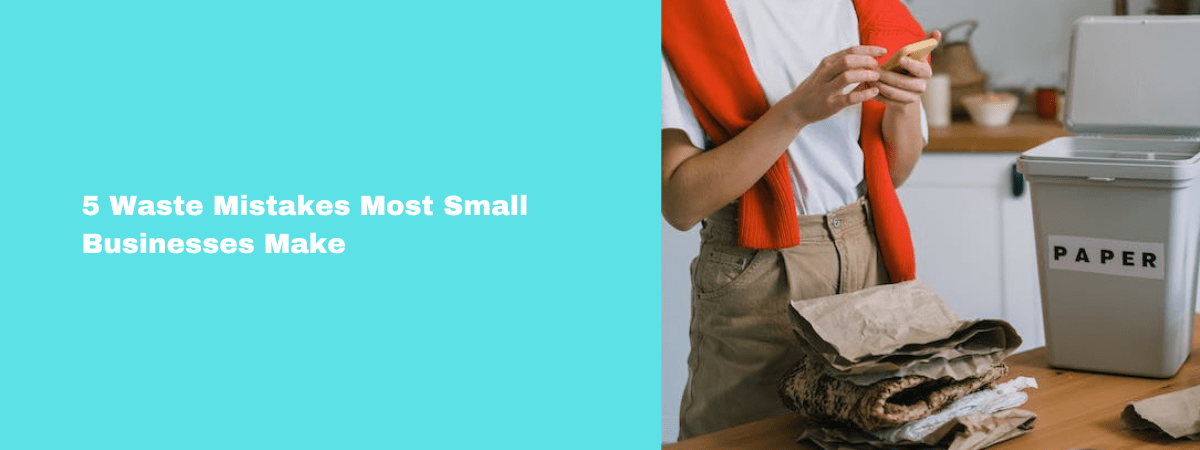Here at Direct365, we know about waste. A lot of the businesses that take waste collection services from us start out by asking us for advice. With over a decade of experience helping small businesses, we know the mistakes that businesses make over disposal of their waste. And it’s this reason we’ve brought this blog together, to try and offer our expertise on waste management and the mistakes that can be made, sometimes without even realising it.
Waste organisation can be a difficult task. The rise in popularity of recycling, and the legislation surrounding waste disposal can make it difficult with businesses and individuals to get to grips with what their responsibilities actually are. Whether you’re looking to take out a service with us, or you’re simply looking for some advice or guidance, we’ve brought together our 5 mistakes most small businesses make. But before that, what exactly are your compliance responsibilities as a small business?
Waste and Legislation
First of all, while all waste legislation is aimed at all businesses, there are organisations that some elements aren’t relevant for. For example, there are clinical waste regulations that still apply to office buildings, but in most cases won’t be relevant because of the lack of clinical waste in these locations. It’s useful to understand the overarching rules of waste management legislation.
The first law to understand is the Environmental Protection Act 1990 and Waste Regulations 2011. These set out a minimum standard of care for businesses. The rules this relates to is:
Environmental Protection Act 1990
Reducing waste creation
Ensuring you’re using a licensed waste carrier for disposal
Waste Regulations 2011
Prevent: reduce waste generation
Reuse: Utilise a plan to reuse materials
Recycle: Ensure you follow correct recycle guidelines for different waste types
Recovery: Compost where possible
Disposal: Only completely dispose in general waste if completely necessary
5 Waste Mistakes Most Small Businesses Make
Recycling Wrong
The most basic mistake small businesses make is that they categories waste wrong, so end up putting the wrong waste in the wrong place. Other problems they have are not following the Waste Regulations 2011 model of prevent, reuse, recycle, recovery and disposal. Often materials businesses regard as waste are recyclable. While there’s a chance they can’t reuse them, there’s often space in your recycling for card, paper, cans, bottles, garden waste and more.
Not Having a Waste Management Plan
This is usually the big reason that organisations are unsure about what to do with their waste. We know full well that your focus will be on running your business and making money. Creating a waste management plan should be high on your agenda, and will help you understand whether you’re breaking the law or not, and how you can refine how your business approaches waste. This includes choosing your waste disposal provider, educating your staff, providing ample waste bins, and more.
Neglecting Food Waste
Food waste is becoming a big deal, and for some businesses, this may not be as much of an issue as others. For hospitality businesses, this is a bigger issue. Food waste can’t be taken to landfill, so that means you need to be careful who disposes of your waste for you. Some providers may be unaware of this legality, or even worse still, be flagrantly ignoring the law. If you follow the five points of the Waste Regulations 2011, one directly relates to food waste: if you can, you should compost.
Not Researching Your Waste Management Company
It may surprise you to think, but there are waste collection services that claim to be legitimate, but don’t have a waste carriers license. This license allows businesses to carry and dispose of your waste and certifies just that. You are able to request an organisation’s waste carriers certificate. If they can’t provide a legitimate one, then that’s your signal to run a mile.
Improper Disposal of Hazardous and Clinical Waste
This one is a big one. And many industries don’t have this problem as such. But ones that do – medial and cosmetic as such – are at risk of incorrectly disposing of dangerous items or fluids. That’s the reason why hazardous and clinical waste needs to be disposed of in the right way. With that, you need to have a specific service that handles that waste. And that’s a mistake many organisations make.
How Direct365 Can Help
Direct365 are fully licensed waste carrier and offer expert waste collection services. There’s plenty of providers but there’s no business like Direct365. For more information on how you can have us collect your waste with a great price and better service, fill out the form below.
Back

